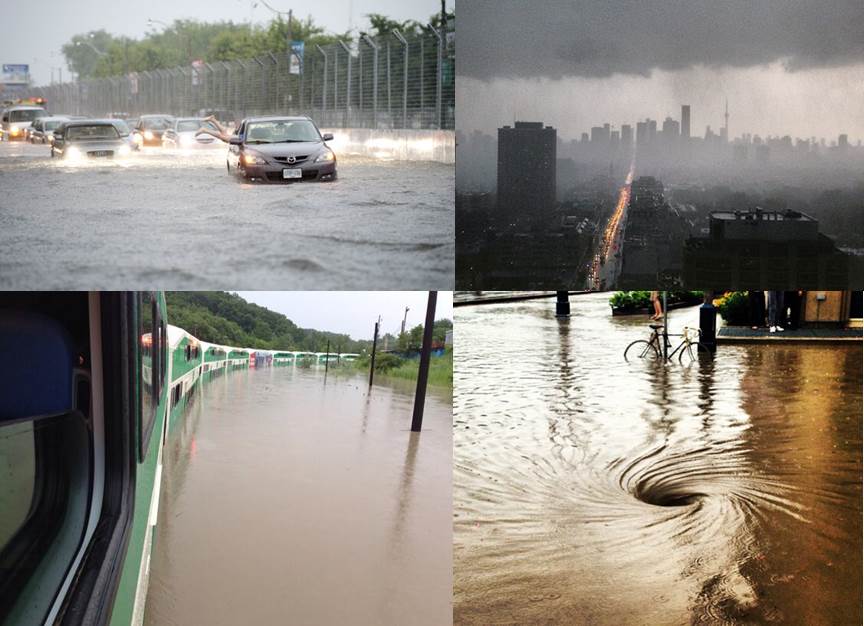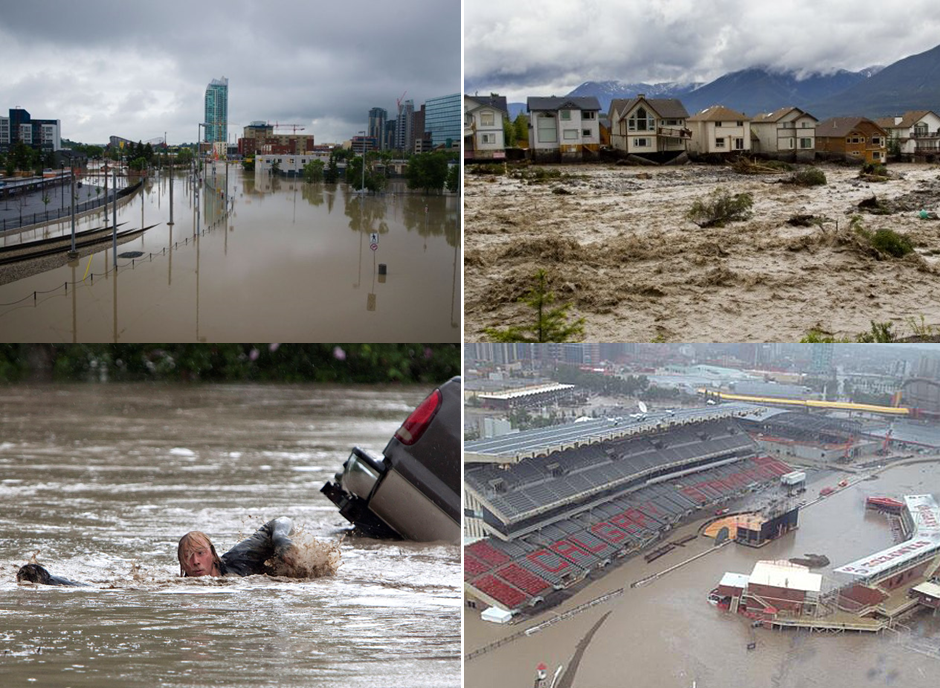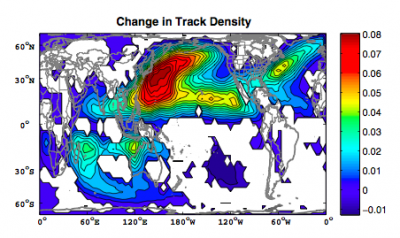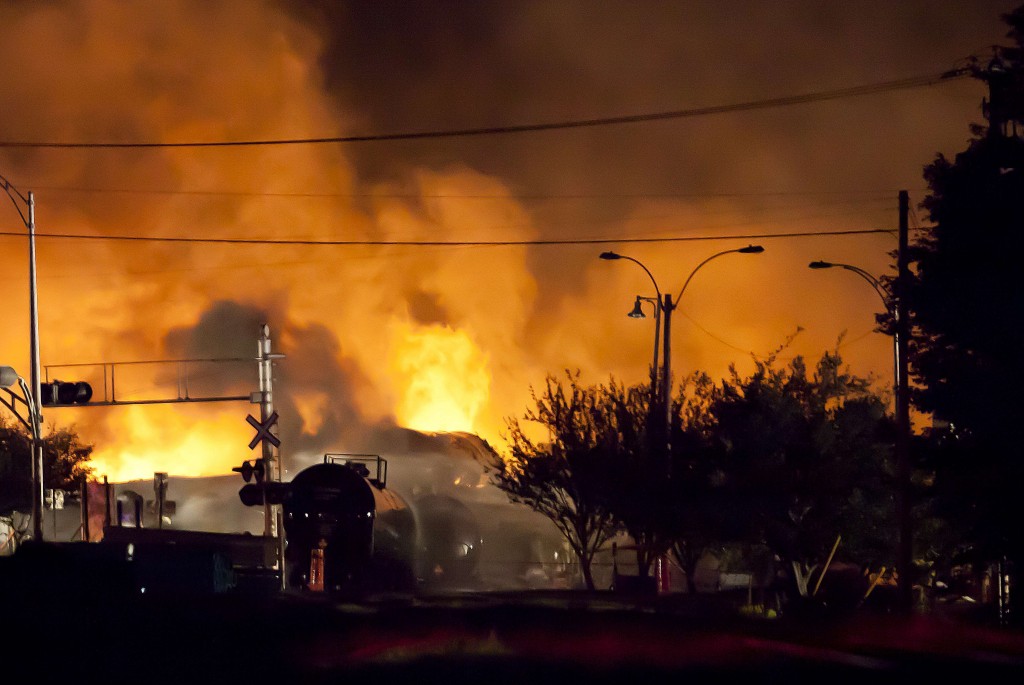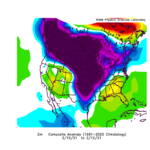Not all of you who read this blog know that Toronto on Monday experienced a record weather event. At around 5 p.m. local time two thunderstorms converged over the northwestern approaches to the city and then traveling southeasterly deposited a monsoonal amount of rain in an hour. Well over 100 millimeters (4 inches) of rain overwhelmed Toronto’s storm water infrastructure. Maintenance covers popped on roadways and sidewalks as fountains of water gushed from storm drains. Underpasses were flooded swamping cars and stranding motorists. The main north-south expressway turned into a swimming pool. A commuter train stalled when it ran into a wall of water in one of the city ravines. It took seven hours to rescue hundreds of passengers who had to retreat to the top floor of the passenger cars to escape the rising water. Electrical substations blew leaving a half million without power. The subways flooded just like in New York City when Sandy struck. My future son-in-law found himself stuck in an elevator where he works when the power to the building went out. It took more than hour to rescue him.
Was this weather event a symptom of climate change?
The second story that recently dominated the headlines is the dramatic floods that covered much of Southern Alberta in the last few weeks and almost caused the postponement of the Calgary Stampede. The cause, heavier than normal rain in the mountains west of Calgary. These rains turned small rivers into torrents washing away bridges, flooding low lying areas, inundating thousands of homes, and causing loss of life. The city infrastructure was incapable of handling this so called once-in-a-century event. The clean up and restoration to Calgary and its surroundings will cost billions.
Was this too a weather event or a symptom of climate change?
And finally we come to the story of the Lac Megantic train derailment which occurred in the past few days. If you don’t know about it what appears to have happened is an unmanned train delivering oil from the Dakotas to an Irving Oil refinery in Atlantic Canada accelerated on its own down a grade eventually derailing and exploding in the heart of a small Eastern Township town southeast of Montreal, Quebec. The inferno engulfed the town’s central core and killed as many as 50.
This is obviously not a weather event. So how is it related to the issue of climate change? Because fossil fuel demand is the primary cause of rising greenhouse gases. This demand is so significant that we need to take oil extracted in the Dakotas and ship it overland by rail to refineries on the Atlantic coast.
Weather Events are Not Necessarily Climate Change Related
What Toronto and Calgary experienced are both rare events. Traumatic but rare nonetheless. What climate scientists are telling us, however, is that such events are no longer storms of the century but more likely storms of the decade. That is, we are seeing them in increasing frequency. The cost of the Calgary clean up will be many billions. The cost of the Toronto clean up is already estimated to be $600 million. We have witnessed several storms of the century in Atlantic hurricanes over the last few years with Sandy and Katrina being by far the most disruptive to both life and property. And it is these decade and sub-decade storms that are, in the opinion of scientists, very much an indicator of global atmospheric warming. These are climate change events.
In today’s Huffington Post I read an article written by Andrew Freedman entitled, Hurricanes And Climate Change: Storms Likely To Get Stronger And More Frequent, Study Shows. It describes a new study by a hurricane researcher at the Massachusetts Institute of Technology who contradicts the consensus view that we will see fewer but more intense tropical cyclones as the world warms. Using global climate models that provide detailed simulations of tropical weather from all around the world, the work appears in Monday’s Proceedings of the National Academy of Sciences. In it the author states that tropical cyclones, particularly in the Northern Hemisphere, will increase in frequency and intensity as seen in the map below throughout the 21st century. The storms will cause more damage and when combined with rising global sea levels place coastal cities at very high risk. In addition the rain produced by these storms will lead to inland flooding, a leading cause of hurricane deaths.
Having just experienced the convergence of two thunderstorms and the amount of rain these relatively small weather events created here in Toronto, I would not want to be at ground zero when future hurricanes make landfall.
What the Lac Megantic Accident Has to do with Climate Change
When all the facts come out the Lac Magentic derailment and fire will probably be ascribed to negligence and lax regulation but we won’t know that until an inquiry rules on all the evidence. Having said that, however, there is a correlation with human-induced climate change because it is the addictive need for us to find, transport and refine more fossil fuel that is at the root of the Lac Megantic tragedy.
Shipping oil by rail from North Dakota to a refinery in the Maritime provinces of Canada is, in my opinion, nuts! The rail line in use is in some places a century old. The cars carrying the oil are single walled. The access takes this hazardous cargo through the heart of town. The train was left unattended overnight because regulations allowed for this.
For the people of Lac Megantic a pipeline would have been far less likely to endanger them than the mode of transport chosen to convey this oil. This oil during refining and later when burned would contribute to the release of CO2 into the atmosphere. But if we didn’t have to ship it, at least it wouldn’t have led to the death of 50 individuals in a small Quebec town. What a price to pay for our fossil-fuel based economy. The oil that did not burn and spilled into the local streams and lakes will produce its own environmental consequences. The fire and all it consumed has certainly contributed to lots of atmospheric carbon.
Will we alter our behaviour as a society because of the accident? Not likely! We’ll go back to requiring that a train not be left unattended through the night. We’ll ship more oil from the Dakotas by rail. Maybe we will see the company scrap its existing inventory of thin-shelled oil tanker cars. And maybe the company will be fined. But we won’t kick the addiction – not until the tragedies get bigger and more costly.

